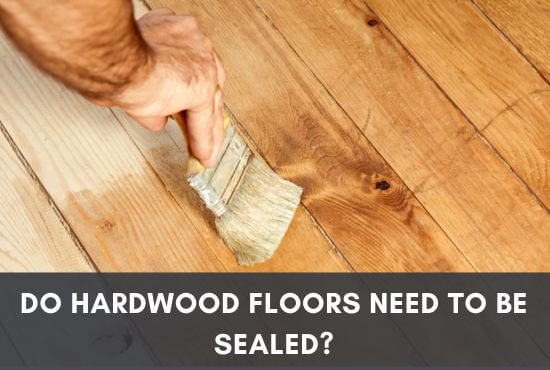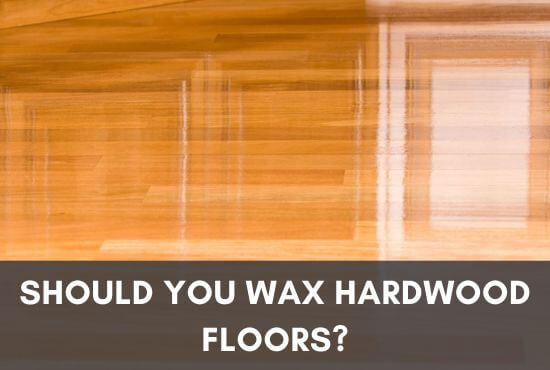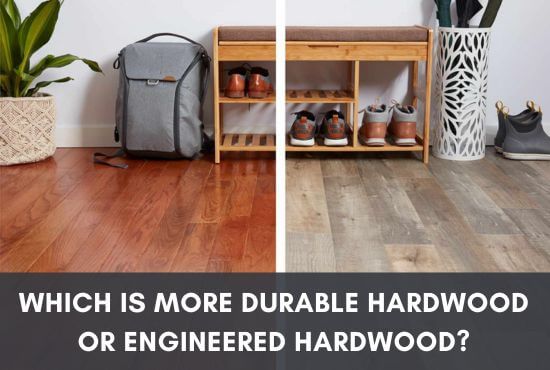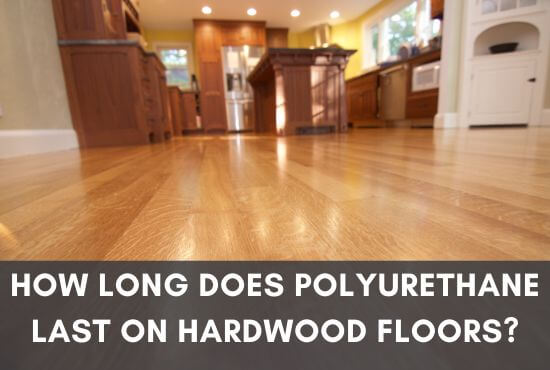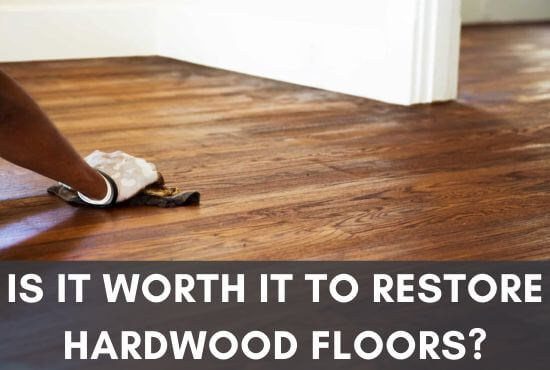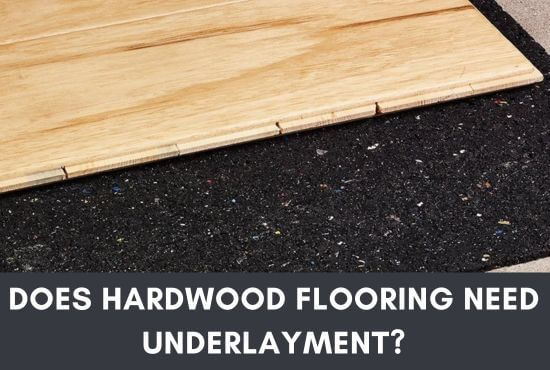Cleaning wooden surfaces is extremely important to keep the wood in its best health and avoid any possibility of termite attacks, infestations, and discoloration.
If you follow a proper cleaning routine, your wooden surfaces will maintain their pristine condition for a long time.
However, using homemade solutions for cleaning the wood is a new fad, and people are turning to vinegar for desirable results. Now a pertinent question here is, does vinegar damage wood floors?
Vinegar does damage and fade wood after constant use over an extended period. The acidic properties are unsuitable for wood surfaces, especially those with oil-based finishes. Besides, the acidic nature can also remove any protective layer on top of the wood.
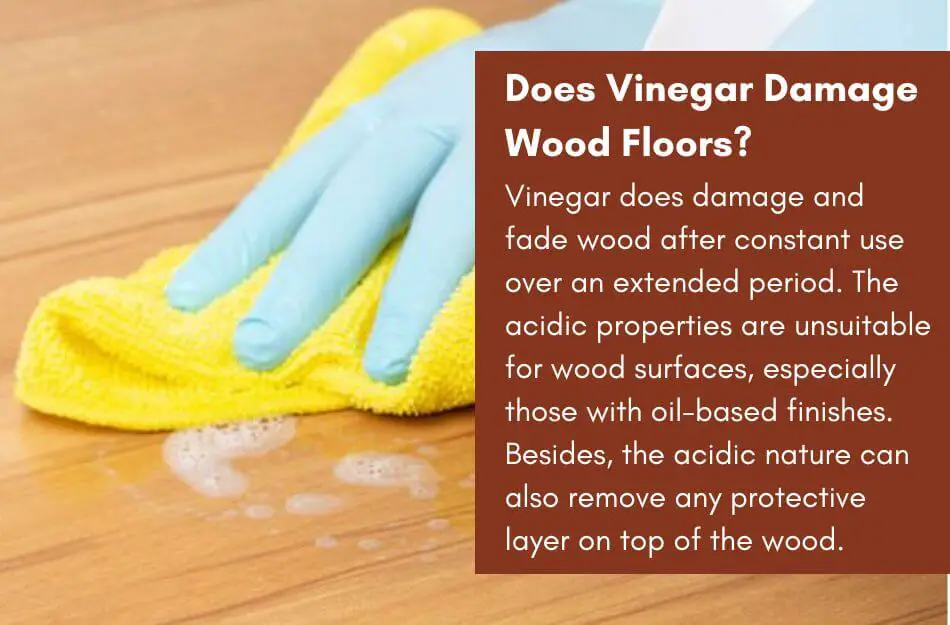
Table of Contents
Is Vinegar Suitable For Cleaning Wooden Surfaces?
Vinegar cleans wooden surfaces, but the cleaning comes at the cost of discoloration and removing any protective layers on top.
With commercial cleaners getting too expensive, people have turned towards homemade solutions for cleaning their wooden floors and other items.
However, if you still want to go for it, I have written a comprehensive guide on the best bona cleaner for hardwood floors, in which I have discussed the top 3 picks of the cleaner.
While DIY home remedies work awesome in most cases, not all are as efficient as they are popular. A good example is the vinegar and water solution.
For a long time, people have believed that the cleaning properties of vinegar can be used on wood.
Hence, a diluted form of vinegar is used to clean wooden surfaces and floors. It is much easier and cheaper than ready-made commercial cleaners.
I have also shared the cheapest ways to clean hardwood floors which you can opt for as well.
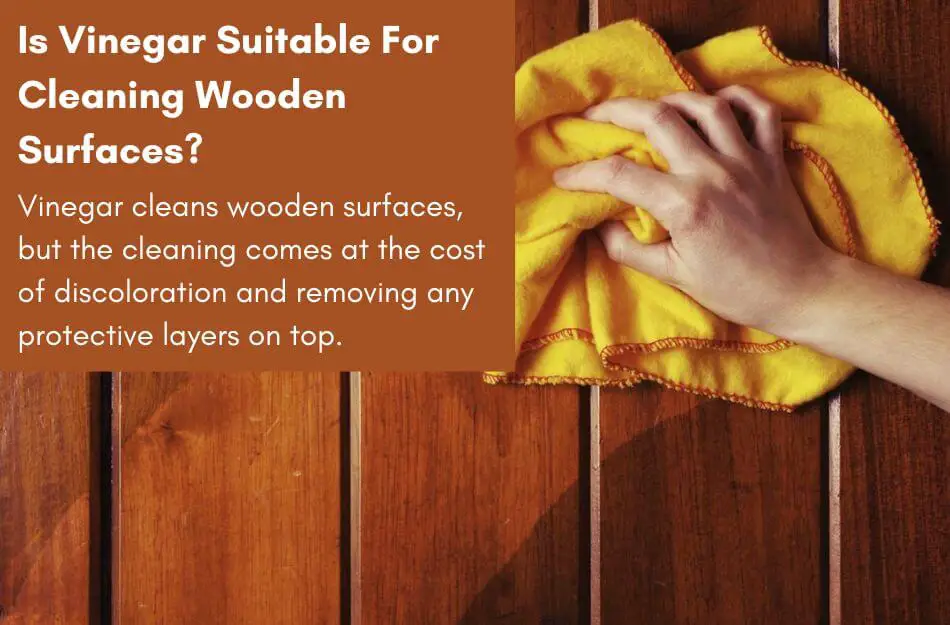
Besides, using commercial cleaners is a hassle as you often have to use a conditioner or polish afterward.
However, using vinegar is not a suitable solution for cleaning wooden floors. Because it contains acid, it can dry up the wood causing it to lose all the necessary moisture.
Repeating this procedure can cause the wood to become dry to an extent where it starts to crack.
This may lead to the wooden floors losing strength and breaking upon impact. Moreover, vinegar can seep into the pores of the wooden flooring if it is not sealed and causes even more damage from the inside.
If your hardwood floor is sealed, your wooden surface might be saved from any possible damage. Still, your sealing layer isn’t guaranteed to be unharmed. Whether your floor is stained, sealed, or painted, vinegar can cause it to fade away slowly.
If you want to know what are the other things you should not use on wood floors, here’s an article I have written all about what not to use on hardwood floors.
I encourage you to just read that if you want to save your wood floors from getting faded or damaged.
Does Vinegar Damage Wood Floors?
Vinegar has acidic properties which can remove and destroy the oil-based finish of hardwood and other wooden floors.
Moreover, if the wood is not finished with oil-based finishes, the vinegar will most probably dry the wood up by removing any necessary moisture inside the wood.
Furthermore, this can cause the wood to wilt or chip and if it is dried to a certain extent, the wood might also start to crack and break upon impact.
Where Should I Not Use Vinegar?
If your wooden floor has an oil-based finish or is sealed/stained/painted, you should not use vinegar on it. Vinegar dries up oil-based finishes causing the wood to lose its shine and color over time.
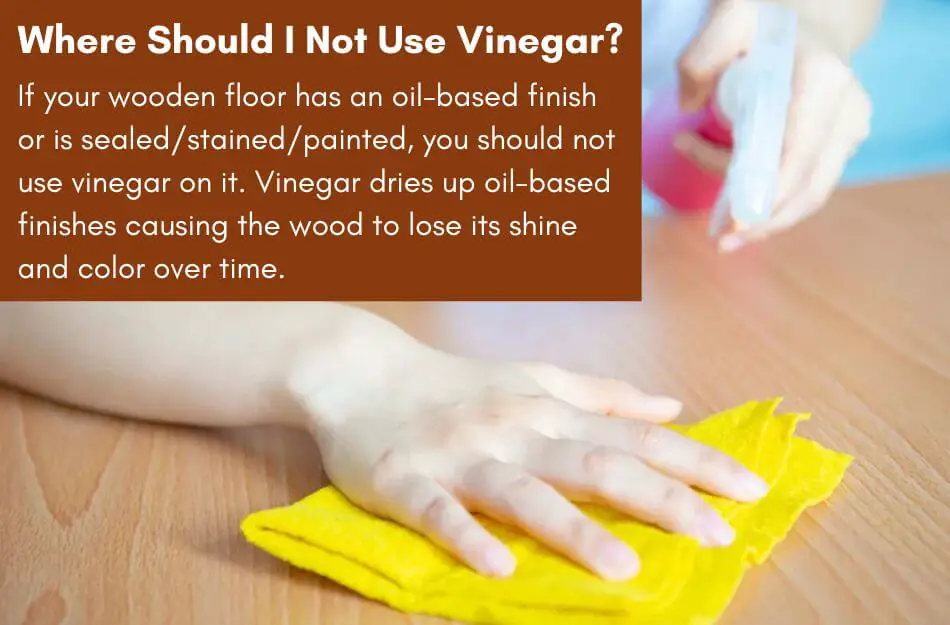
Suppose you try to solve that problem with olive oil. In that case, you will surely fail as the consistency of olive oil will not match with stainers, paints, sealants, or oil polishes.
How Do I Clean Wood Floors?
If you have ignored your wood floors lately, this section should concern you directly. Cleaning wooden items regularly can eliminate infection risks and increase longevity.
Suppose you need to clean your floors on time. In that case, there is a high chance that it has been covered in dust, and not only does it pose a threat to your health, but the furniture and floors might also be decaying without your knowledge.
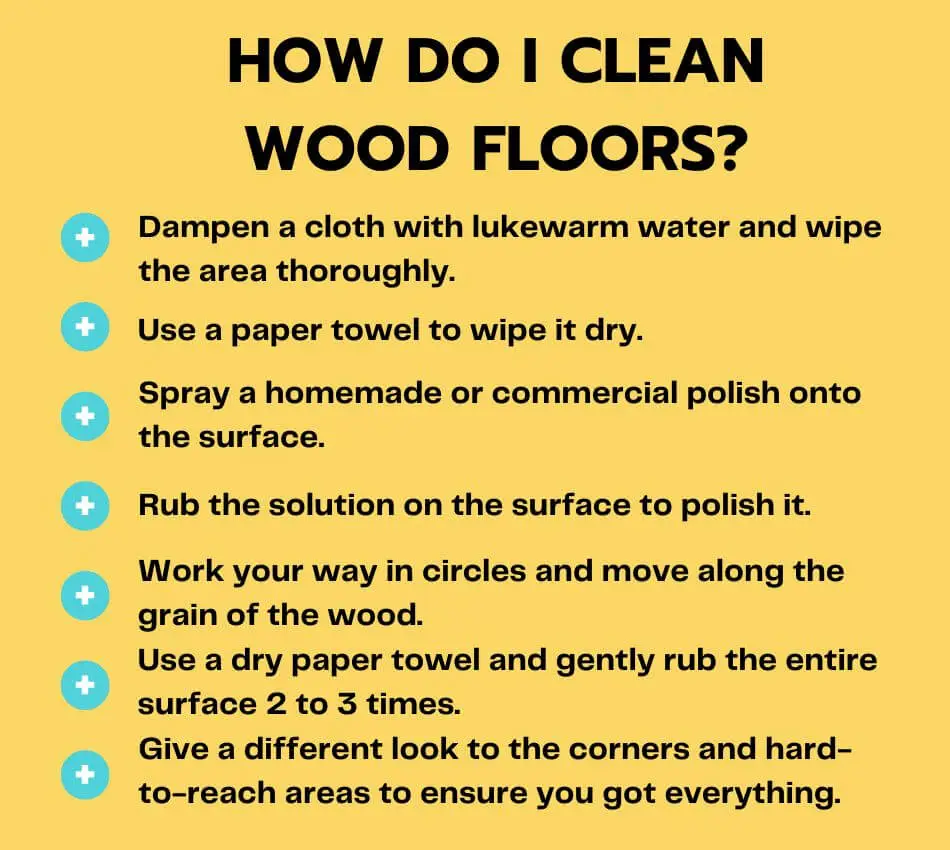
Here is the proper way to clean your wood floors:
- Dampen a cloth with lukewarm water and wipe the item thoroughly. This will remove any crusted or layered dust so you can work your way to the surface.
- Use a paper towel to wipe it dry. This will remove any stickiness which is not visible to the naked eye.
- Make sure to clean the corners and edges properly. Good scrubbing can prevent dust and grime from accumulating in the intersection points and under the corners.
- Spray a homemade or commercial polish onto the surface and try to cover it all.
- Rub the solution on the surface to polish it. You may use kitchen towels or a clean, dry cloth.
- Work your way in circles and move along the grain of the wood. Doing so would eliminate any chances of scratching the surface and allow the polish to settle.
- Use a dry paper towel and gently rub the entire surface 2 to 3 times. This will remove any extra moisture and lock in the shine your wooden floor has just achieved.
- Give a different look to the corners and hard-to-reach areas to ensure you got everything.
Follow my article on how often should you clean your hardwood floors so that you can stick to an ideal cleaning routine, and even your most dull floors will start to shine again.
Does White Vinegar Stain Hardwood?
Vinegar can stain hardwood as it is an acid (source) that eats away wood finishes. If you use vinegar with very hot water, you might start to see the stains even quicker.
The results are usually dull white patches on your floor which leave your hardwood surface exposed and prone to damage.
How Do You Remove Vinegar Stains From Hardwood Floors?
The easiest way to remove vinegar stains from wood is to use a dishwashing detergent and hot water to wipe off the stains.
Mix a few tablespoons of dishwashing agent in hot water and use a damp cloth to wipe them off the surface.
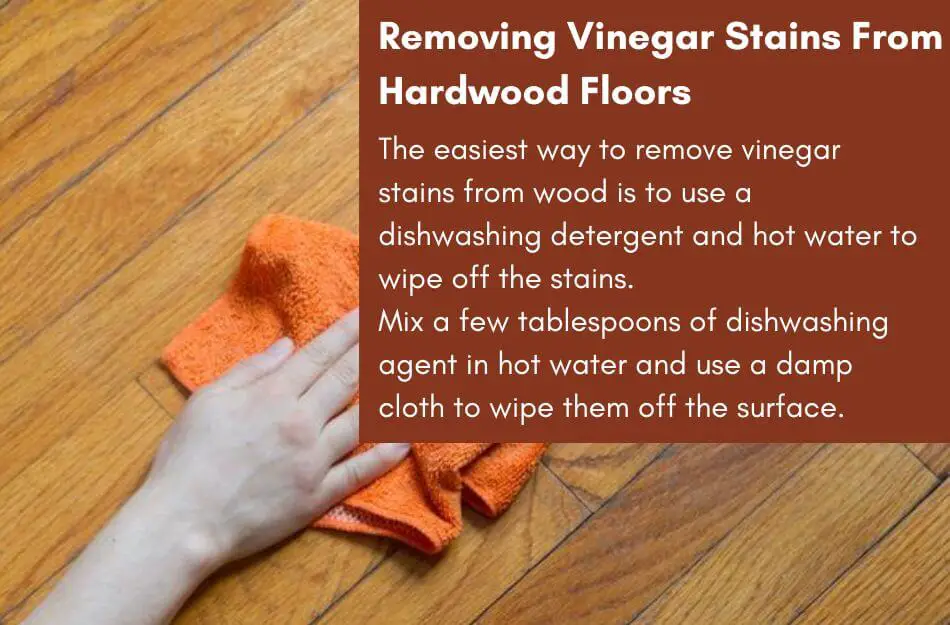
If you want to take the cleaning one step further, you can use an alkaline solution to counter the acidic stains on the hardwood floors.
Pamper The Wooden Surfaces
Whether you live alone or with a family, you are responsible for looking after the house and ensuring that everything is pristine.
Wooden items or furniture often get infected with termites or infections if you don’t care for them.
Kids in the house might play a major role in this as they often spill things all over, which can create molds and cause the deterioration of wood.
You must be cautious about cleaning your floors regularly to prevent infection.
Here are some tips for maintaining wooden floors and preventing them from getting dirty or infected.
- Clean the wooden items daily so that dust doesn’t get layered.
- Wipe the wooden floors with a damp, warm cloth at least once a week so the shine of the wood doesn’t fade away.
- Apply a homemade polish every 15 days to restore the wood’s lost shine and lock it in.
- Lastly, spray a natural wood disinfectant at least once a month to eliminate any risk of infections festering into your floors.
Final Thoughts
Using vinegar to clean wood is a good idea if used on non-sealed surfaces with olive oil. But it is in the best interest of the health of your wooden items that you refrain from using vinegar solutions on any other type of wood floor.

As a co-creator of FlooringFlow.com, Emma Sophia comes on board to answer all your questions related to any flooring problems. Together with John Henry, she’s gained extensive experience in fixing many flooring problems in their own house as well as in friends and family’s. Now, she wants to share her knowledge that she gained during floor remodeling, restoring, and DIY projects.

